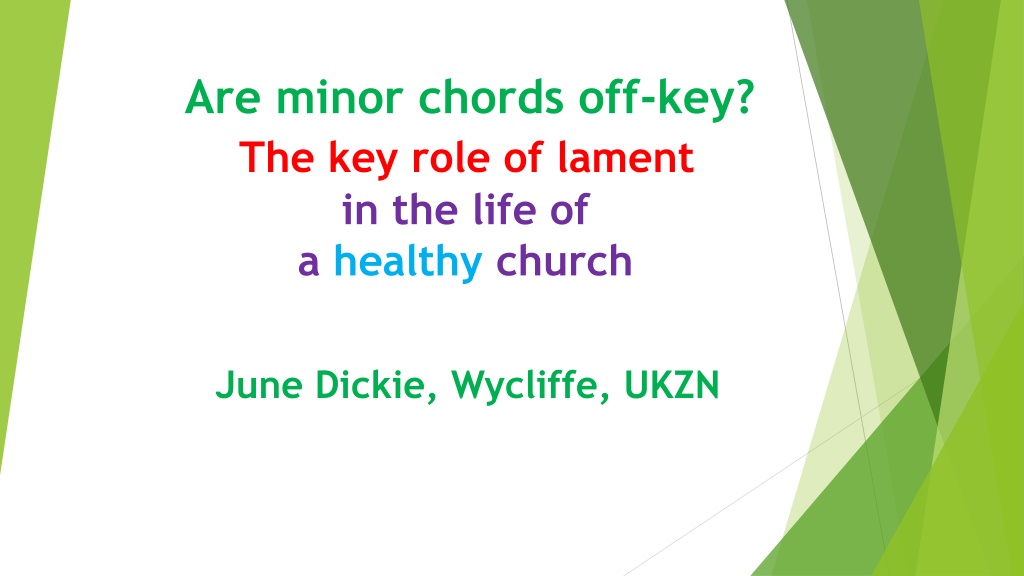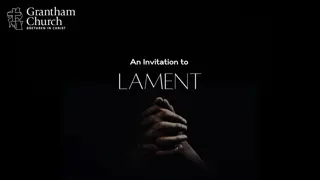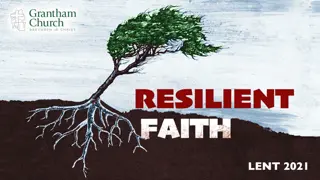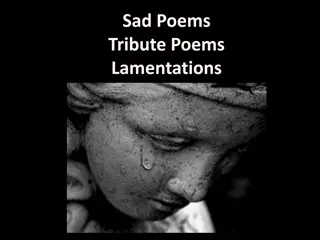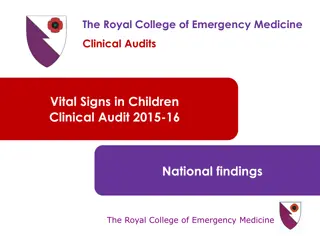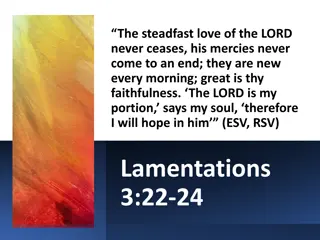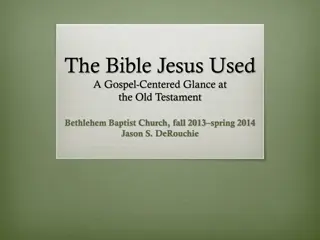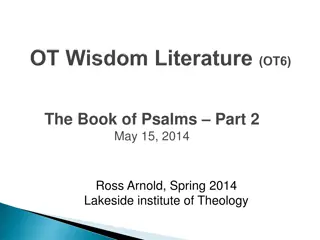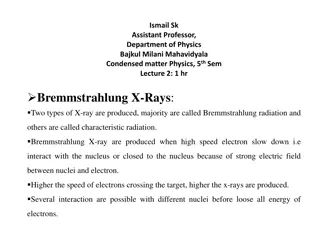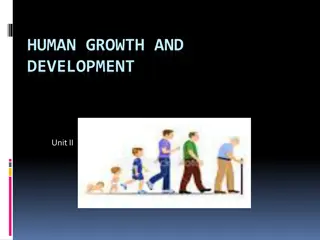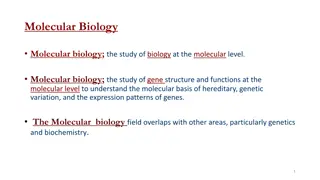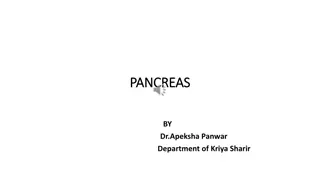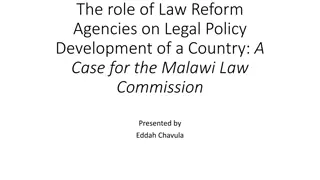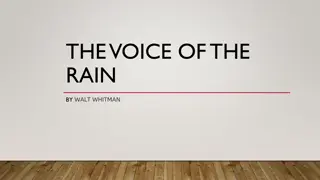The Vital Role of Lament in the Church's Life
Lament, as a raw expression of distress before God, plays a crucial role in the life of a healthy church. It is a form of uncensored communion with God, signifying an act of faith and recognizing God's worth. The elements of biblical lament include addressing God, voicing complaints, making requests (often for justice), affirming faith, and sometimes vowing to praise. The history of lament in the Church reveals its significance through the ages, emphasizing the modern necessity for lament as a practice of faith to prevent the loss of the church's mission and connection to hope.
Download Presentation

Please find below an Image/Link to download the presentation.
The content on the website is provided AS IS for your information and personal use only. It may not be sold, licensed, or shared on other websites without obtaining consent from the author. Download presentation by click this link. If you encounter any issues during the download, it is possible that the publisher has removed the file from their server.
E N D
Presentation Transcript
Are minor chords off-key? The key role of lament in the life of a healthy church June Dickie, Wycliffe, UKZN
Lament is . . . . . . the brutally honest and confrontational expression of distress before God (Lynch) uncensored communion with God - visceral worship (Gilliard)
Essence of lament: an act of faith Not wanting to give up relationship with God (when experience does not match belief) Thus lament is WOR-TH-ship (recognizing God s worth)
Elements of biblical lament 1) address to God, 2) complaint / protest 3) requests (often includes a request for justice) 4) affirmations of faith 5) vow to praise (sometimes)
History of lament in the Church 1) biblical times: often set to music for community to sing ( for choir director ) 2) 15th-16th: Luther, theology of the cross : express pain; lament but also faith 3) 19th: hymns (Watts, Wesley), sorrow songs (African-Americans) 4) 1980s: praise and worship choruses
Somewhere along the way, we modern Christians began thinking of lament as optional instead of a required practice of the faith. (Gilliard)
Contemporary churches provide few opportunities for expressing our grief, despair, anguish in the company of others and in the context of faith in God. (Duff)
The result? Church LOSES her mission!
lam ent + hope lam ent + hope The church s mission and gift in the world is connected to her ability to enter into the experience of lament with hope (Katongole)
The church becomes like the world 1) forgotten how to weep 2) individualistic (my personal well-being, avoidance of suffering) INSENSITIVE TO THE CRIES OF OTHERS (Pope Francis)
How can the Church recover her reason for being? The only way . . is to experience the cross (Katongole). Church must become a community of lament . We need to help people enter into the darkness (Hall), into suffering that God has already entered (Moltmann)
Current Church practices which exclude lament: 1) avoidance of certain Scripture passages 2) exclusion of elements of lament from songs sung in worship
Not avoiding difficult passages e.g. Rah preaching 6x in Lam. Result? Community shaped by a radically countercultural perspective People encouraged to challenge status quo and cry out against existing injustices.
Lack of lament in contemporary worship songs 2015, Strickler: none included lament 2017, Lynch: CCLI (3 of top 100 included aspect of lament, but did not linger ) Bethel: not in time of pain, always past Solutions offered too quickly. Pain not experienced in darkness .
Pain is too uncomfortable to provide a pause, and allow the emotion to sink into one s psyche. But without this lingering reflection, the pain remains unvoiced and untreated.
Worship leaders have only begun to walk around the edges of the pastoral significance of the lament song. (Lynch) e.g. Blessed be your name (Matt Redman) includes only pious lament from Job 1-2. What about Job 3-31 where Job rages and disputes with God?
Consequences of the lack of lament 1) hurting people are not helped 2) God is not recognized for all that God is, and so worship is shallow There are things which can be seen only by eyes that have cried (Archbishop Christopher Munzihirwa). 3) Issues of social justice are ignored or not dealt with effectively
BUT lament facilitates 1) spiritual authenticity Wolterstorff (in response to the death of his son): It was not anger I felt but hurt - hurt and bafflement. How could I fit together my son s untimely death with the God I worshiped? I knew the traditional strategies for doing so, but I found I could not accept them. . .
Wolterstorff (ctd.) I shall continue to rail against Eric s untimely death. This should not be. . . I joined the psalmist in lamenting without explaining. It had the effect of making God more mysterious. . . . I cannot make sense of it . . The God who became more mysterious to me has also become more awesome, awesome beyond comprehension.
2) Lament facilitates compassion E.g.) Pope Francis visiting Lampedusa Compassion struggles with and against, celebrates and laments . Lack of lament (only praise) => justice issues considered improper before God (Brueggemann)
Restoring lament to the Church Go beyond white noise of sufferings: 1) remember omissions; be more attentive 2) establish patterns in worship - at least one element in a service
5 practical steps: 1) Teaching and preaching Include hard passages (whole of Job, Eccl, Lam, Pss of lament) 2) Practice of corporate lament (standing with those who suffer) We need to be able to enter into the pain of the other, weep with those who weep .
5 practical steps: 3) Introduction of worship songs which include sustained lament Sing whole psalm, without additions or changes 4) Reading of biblical laments - for individual to express him/herself - as prayer, part of corporate liturgy - sufferers use form to compose own laments
5 practical steps: 5) Establish lament rituals - Special services for local / national tragedies or for people to bring personal concerns. Include music, symbolism, name concern publicly. - Responsive prayers or pastoral prayer with lament refrains
Lament is costly, and crucial - it unleashes compassion, joins us to God s compassion, thus is a pathway to hope (Hickey). It enables suffering people to wor-th-ship God
Are minor chords off-key? In music, major and minor are part of scales. The composer uses both. In life, praise and lament are part of seasons. The Creator provides both. We need lament!
